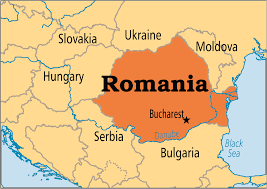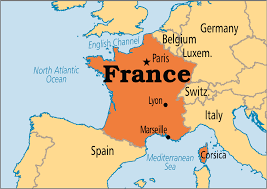
Ionesco's Homes: 20th Century Romania & France

Modern day Romania
Romania
In the early 20th century, Romania was finding itself in the larger picture of the world. It had just gained independence from the Ottoman Empire in the late 19th century and was experiencing economic growth as a result of the oil industry taking off. In 1914, two years after Ionesco’s birth, King Carol died ending Romania’s alliance with the Central Powers, Germany and Austria, and in 1916 enters World War I with the Allied Powers. As part of the peace treaties at the end of World War I, Romania acquired new territories nearly doubling its size and population. In the 1930s, Romania sees a rise in fascism and King Carol II establishes a dictatorship. Less than twenty years later, in 1948, there is a communist takeover. The 20th century was a time of great change in Romania. Romania gained and lost many territories and went through a dramatic political change from independence from the Ottoman Empire to Fascism and eventually a Communist takeover leading to a revolt in the 1990s. Ionesco was in Romania during World War I and witnessed many of his friends being converted to fascism.

Modern day France
France
France was also going through a period of new identification in the early 20th century. France had recently reorganized itself into the Third Republic from 1875-1940. This time was marked by general stability and industrialization. It was only general stability because of the Dreyfus affair of the 1890s when an army officer, Alfred Dreyfus, was charged with selling military secrets to Germany. He was found guilty and sentenced to imprisonment but many people in France thought him to be innocent and it became a very divisive topic throughout the 1890s. He was eventually pardoned in the early 1900s. The pre-World War II period was often called “the beautiful age.” In 1914 Germany declared war on France and World War I began. This period of France’s history is marked by a strong sense of patriotism, which quickly disappeared over the course of the war. France was hit hard by the aftermath of World War I and spent the interwar years recovering. Reconstruction of infrastructure as well as increased immigration helped France to recover during this period. This recovery occurred fairly quickly and by the end of the 1920s France was back to the thriving country it had been in the prewar period. This only lasted so long, however, as the Great Depression struck France in 1931, later than most other European countries. As a neighbor of Germany, France was also feeling the growing strife of Adolph Hitler’s reign and the growth of Nazi power. In 1940, Britain and France declared war on Germany, entering World War II. Ionesco had just moved back to Paris at this time and arrived with his wife shortly before the war began. Pre-1940 France, under the Third Republic, found a sense of equality among social classes and universal suffrage gave the middle and lower classes more power.
After World War II, France found itself trying to rebuild its society and government once again. The Vichy government was the original solution, holding power from 1940-1944. An anti-German underground movement ousted it. In 1945 the Fourth Republic began to form. Women were granted suffrage and there was a sense of renovation and change. Many of France’s colonies began to seek and attain independence in the 1940s and 50s. New change came quickly and France continued to innovate. France entered the Fifth Republic in the late 1950s. After De Gaulle’s death in 1970 France begins to swing toward Socialism and in the 1980s has a succession of 14 years of socialist presidents ending in 1995. Ionesco spent much of his life in Paris and experienced the political strife of World War II as well as the reinvigoration of French society in the post war period.
Works Cited:
"Eugène Ionesco." Encyclopedia of World Biography. Encyclopedia.com. 24 May. 2018, http://www.encyclopedia.com.
Hayman, Ronald. Eugene Ionesco. Frederick Ungar Publishing Co., 1976.
Higonnet, Patrice Louis-René, et al. “France.” Encyclopædia Britannica, Encyclopædia Britannica, Inc., 2 May 2018, www.britannica.com/place/France.
“Romania Profile - Timeline.” BBC News, BBC, 12 July 2017, www.bbc.com/news/world-europe-17776876.